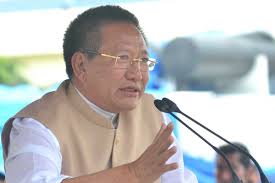
Nagaland Announces Plan for Climate-Resilient and Accountable Healthcare System

 :
| Updated On: 08-Oct-2025 @ 1:00 pm
:
| Updated On: 08-Oct-2025 @ 1:00 pmSHARE
On October 7, Nagaland Deputy Chief Minister TR Zeliang reiterated the state government’s dedication to establishing a robust and resilient healthcare system capable of addressing emerging challenges such as demographic shifts, disease transitions, and the impacts of climate change. Speaking at the inaugural session of the Health Financing Forum for Cross-State Learning in the Northeast Region, jointly organized by the Nagaland government and the World Bank, Zeliang highlighted the state’s focus on preventive and primary healthcare, strengthening referral systems, and enhancing hospital management. He emphasized that effective health financing requires not only raising resources but also their efficient utilization, asserting that health, as a critical component of human development, demands a holistic approach integrating infrastructure, manpower, financing, and governance.
Zeliang lauded the World Bank’s Result-Based Financing (RBF) model, noting its measurable improvements in accountability and performance in healthcare delivery. Through RBF, healthcare facilities are incentivized for achieving measurable outcomes, enhancing transparency and efficiency in financial management. He urged all Northeastern states to adopt innovative and collaborative strategies tailored to the region’s unique socio-geographical realities. Emphasizing the need for financial protection for vulnerable populations, Zeliang called for efforts to reduce out-of-pocket expenditures through collective action by stakeholders.
The two-day forum aimed to facilitate cross-state learning among policymakers, health professionals, and experts, strengthening health financing mechanisms across the Northeast. As part of the event, Zeliang released the FinHealth Assessment Report, providing a detailed analysis of the region’s health financing landscape and proposing reforms to improve efficiency, equity, and effectiveness in the delivery of health services.
Marion Cros, Senior Health Specialist at the World Bank, praised the Northeastern states for their innovative approaches to addressing healthcare challenges. She noted that Nagaland and Mizoram have introduced universal health insurance schemes aimed at reducing financial burdens on citizens, while Assam and Meghalaya are piloting results-based payment systems to reinforce primary healthcare services. The forum emphasized sharing best practices, learning from cross-state experiences, and implementing innovative strategies to create resilient and accountable healthcare systems in the region.
Zeliang’s remarks highlighted the broader vision for a healthcare system in Nagaland that not only addresses immediate health needs but is also adaptive to future challenges, including those posed by climate change. He emphasized that integrating preventive care, robust referral mechanisms, and efficient hospital management is crucial for achieving long-term improvements in public health. By leveraging models like RBF, the state aims to incentivize performance, improve transparency, and ensure the optimal use of resources, thereby fostering a culture of accountability in healthcare service delivery.
The forum underscored the importance of collaboration among Northeastern states, encouraging them to adopt region-specific innovations that account for local socio-economic and geographic conditions. By reducing out-of-pocket expenses and providing financial protection to the vulnerable, the states can ensure equitable access to quality healthcare services. The FinHealth Assessment Report serves as a guiding document for policymakers, identifying gaps and recommending reforms that can strengthen health financing mechanisms, improve efficiency, and enhance equitable access to healthcare.
Overall, the forum and Zeliang’s statements reflect a comprehensive approach to healthcare reform in the Northeast, combining resource mobilization, efficient financial management, capacity building, and innovative strategies. By focusing on preventive and primary healthcare, integrating technology, and fostering cross-state learning, Nagaland and its neighboring states aim to create resilient, accountable, and inclusive healthcare systems capable of meeting both current and future challenges in public health. This initiative represents a significant step toward achieving holistic and sustainable healthcare development in the region.